Korean Air feels impact of cargo demand drop

Seoul, South Korea-headquartered Korean Air is feeling the impact of the drop in global air cargo demand, as reflected in its financial results for the fourth quarter of last year.
The airline has reported ‘tentative’ (i.e. non-consolidated) results that show cargo revenue fell by 29% year-on-year to KRW1.5tn ($1.2bn).
Demand for freight capacity was diminished, the carrier said, by the “global economic slowdown”. It also suffered from decreasing shipment rates as a result of increasing passenger aircraft belly and dedicated cargo capacity.
As a whole, Korean Air made revenue of KRW3.6tn ($2.8bn), a 28% year on year increase, based on the recovery in passenger demand and what it described as “steady cargo profit”.
Passenger revenue exceeded cargo revenue, which Korean Air took as being “a sign of a full-fledged passenger demand recovery phase”.
The airline saw operating profit in the fourth quarter of last year fall by 26% decrease year-on-year.
Across the whole of 2022, the airline’s revenue was up 53% on 2021, while operating profit rose by 97% year on year.
Because of the global economic slowdown, the airline is forecasting further weak demand for air cargo capacity in the future.
But, the airline is looking to attract business by strengthening co-operation with large shippers and global forwarders, and will, it said, “respond to market volatility by enhancing service quality, including additional certification on special cargo”.
